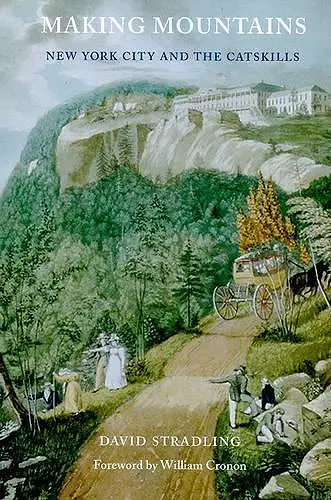Making Mountains
New York City and the Catskills
Format:Paperback
Publisher:University of Washington Press
Published:11th Feb '10
Currently unavailable, and unfortunately no date known when it will be back
This paperback is available in another edition too:
- Hardback£43.00(9780295987477)

A pivotal work in environmental history that makes connections between issues of urbanization, resource development, land use, cultural representation, and environmental consciousness in new and provocative ways. -- Marguerite S. Shaffer, Miami University One can discern the entire American relationship with nature through the prism of the Catskills: colonialism, subsistence agriculture, industry, ethnic segregation, and, more recently, a species of post-modern placelessness. -- Karl Jacoby, Brown University Making Mountains is the finest modern history yet written of the Catskills-a chain of mountains that looms far larger in the national consciousness than one might think possible given their limited extent and modest height. And yet, because of the Catskills' special relationship to New York City, they became in the early nineteenth century the principal vehicle for helping Americans understand the meaning of the romantic sublime, and so shaped all subsequent American thinking about nature. David Stradling's book should interest anyone seeking to understand how rural and urban Americans have worked together to reinvent and reinterpret our national landscape. -- William Cronon, University of Wisconsin-Madison For those of us who live [in the Catskills] as well as visitors, this book reminds us of the genuine advantages of the mountains and when we read the quotes from years past, we know that these qualities are still here. This is a good book to have on your shelf... Making Mountains enriches the experience of the Catskills and also provides an interesting thesis on the history of the area. Towne Crier, Livingston Manor, NY
For over two hundred years, the Catskill Mountains have been repeatedly and dramatically transformed by New York City. This book shows the transformation of the Catskills landscape as a collaborative process, one in which local and urban hands, capital, and ideas have come together to reshape the mountains and the communities therein.
For over two hundred years, the Catskill Mountains have been repeatedly and dramatically transformed by New York City. In Making Mountains, David Stradling shows the transformation of the Catskills landscape as a collaborative process, one in which local and urban hands, capital, and ideas have come together to reshape the mountains and the communities therein. This collaboration has had environmental, economic, and cultural consequences.
Early on, the Catskills were an important source of natural resources. Later, when New York City needed to expand its water supply, engineers helped direct the city toward the Catskills, claiming that the mountains offered the purest and most cost-effective waters. By the 1960s, New York had created the great reservoir and aqueduct system in the mountains that now supplies the city with 90 percent of its water.
The Catskills also served as a critical space in which the nation's ideas about nature evolved. Stradling describes the great influence writers and artists had upon urban residents - especially the painters of the Hudson River School, whose ideal landscapes created expectations about how rural America should appear. By the mid-1800s, urban residents had turned the Catskills into an important vacation ground, and by the late 1800s, the Catskills had become one of the premiere resort regions in the nation.
In the mid-twentieth century, the older Catskill resort region was in steep decline, but the Jewish "Borscht Belt" in the southern Catskills was thriving. The automobile revitalized mountain tourism and residence, and increased the threat of suburbanization of the historic landscape. Throughout each of these significant incarnations, urban and rural residents worked in a rough collaboration, though not without conflict, to reshape the mountains and American ideas about rural landscapes and nature.
"Stradling has given us an entirely new understanding of the complex interrelations of the urban and rural landscape. This is an excellent history."
* Environmental History *"Making Mountains is perhaps the best example yet of a small but growing literature that links urban, suburban, and rural space into a synthetic narrative of social and environmental change. Stradling neither dismisses rurality as a static and homogenous placeholder irrelevant until colonized by the suburbs nor privileges simplistic ideals, whether of wilderness or bucolic agrarianism, that do not reflect the complexity of life beyond the metropolis.. [A]n outstanding work of environmental and urban history that should remind scholars that despite the apparent distance between the two, the city and the country share a common history and a common future."
* H-Net *"The main strength of this sophisticated book lies in Stradling's moving beyond stating the Catskills' importance in forming American ideals of the countryside and wilderness or describing its role in the early conservationist movement. His most sweeping conclusion holds that scholars' traditional 'imperial model,' emphasizing the dominant role of urban elites in transforming the environment, tells an incomplete story. In the Catskills, urban tourists, weekenders, and natives whose families named the landscapes together shaped— and shape— the region."
* The Journal of American History *"Making Mountains [is] an engaging read [in] its focus on and exploration of the bridgeable chasm between the country and the city, the rural and the urban, the metropolis and the mountain chain, places of change and places of assumed stasis. . . . Making Mountains will be insightful for all scholars working on the friction and contentious contact zones and conditions that emerge when rural and urban realities and their cultural producers and discourses are brought into play."
* Electronic Green Journal *"Making Mountains is a meticulously researched and intellectually focused piece of scholarship, but— clearly written, engaging, and full of telling anecdote— it is also designed to reach a wide audience."
* New York HistoISBN: 9780295990149
Dimensions: unknown
Weight: 544g
336 pages